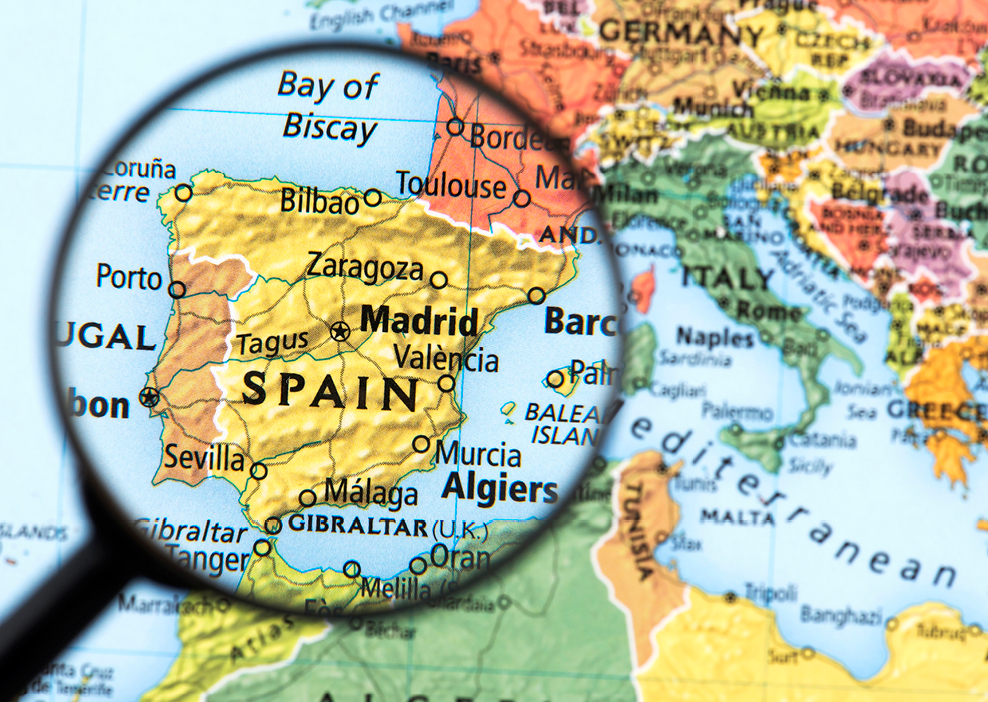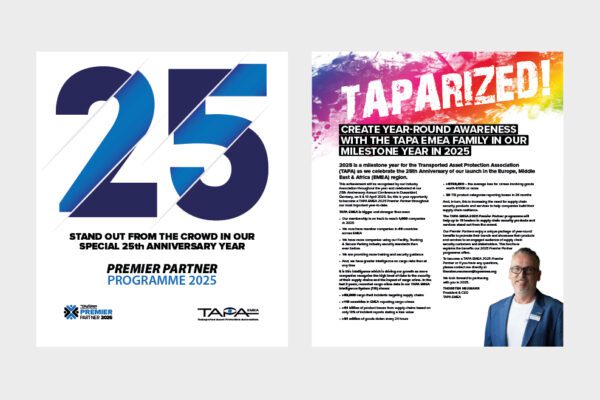
Spain Takes a Community Approach to Fighting Rising Cargo Crime
Over 150 supply chain and security delegates registered to join TAPA EMEA’s local language cargo security conference in Madrid on 9 October 2024, hosted in partnership with ADSI – Asociación Directivos Seguridad Integral, Spain’s national association of security professionals.
The event brought together a host of leading speakers and panellists to offer their unique insights into the risks posed to supply chains across a country which has recorded over 2,700 cargo thefts in the TAPA EMEA Intelligence System (TIS) database in the last 3 years and product losses of well over €70 million.
TAPA EMEA’s Regional Lead for Portugal & Spain, Filipe Joel de Almeida, shared this report with Vigilant from Madrid…
Our conference in Madrid focused on the theme of ‘How to Secure Supply Chains in Spain’ and brought together specialists with a wealth of expertise from key industry and public-sector organisations. The event shed light on crucial aspects of supply chain security, cargo crime incidents, loss prevention, and the efforts required to safeguard logistical operations in an increasingly volatile environment.
Institutional Perspective: Guardia Civil and TAPA’s role
The conference kicked off with a law enforcement agency perspective by General Antonio Cortés Ruiz of the Guardia Civil. He highlighted the critical role that law enforcement plays in securing supply chains, particularly in Spain, where the influx of goods and the country’s strategic location make it a hub for both legitimate trade and criminal activity.
On behalf of TAPA EMEA, I then introduced our Association’s role and work to minimise losses from supply chains, including its mission to enhance security standards across global supply chains. This included presenting TAPA’s Facility, Trucking and Secure Parking security Standards (FSR, TSR, and PSR) and certification programme and how these have become vital tools in mitigating risks by providing rigorous audit systems and fostering collaboration among key stakeholders in the logistics and transport sectors.
Risks, Border Controls, and Customs Insights
Carles Cardona from OEA Consultores introduced the topic of Customs’ pivotal role in international supply chains, while Don José Luis Valle from Spanish Customs delved into the risks inherent at national borders, particularly concerning the illicit movement of goods. His presentation emphasised the complexity of modern supply chains, the vulnerabilities these can create, and how organised crime groups can exploit security weaknesses. Don José Luis Valle outlined specific threats such as drug trafficking, the movement of illegal arms, and other forms of contraband that jeopardize both national security and the integrity of commercial supply chains.
He presented a series of recommendations for mitigating these risks, including the importance of enhanced risk assessment techniques, such as real-time data analysis and the use of artificial intelligence in customs inspections. Collaboration between law enforcement and logistics providers was also emphasised as a critical factor in addressing the challenges posed by illicit cross-border trade.
Criminologist Report: Cargo Theft and Last Mile Crime
Begoña Romero from CPCM – Madrid’s Professional Criminologists College – provided an in-depth analysis of cargo crime statistics across Spain, with a particular focus on theft before and during last mile delivery. Her data indicated that a significant percentage of cargo thefts occur in unsecured parking areas and during the final stages of delivery, often when goods are most vulnerable.
This presentation, and the reports developed by CPCM, have been supported by incident evidence gathered from TAPA’s Intelligence System (TIS), which highlighted the economic toll of such crimes. Cargo theft, particularly of high-value items such as electronics, fuel, and construction materials, resulted in millions of euros in losses, with over €70 million attributed to cargo crimes in Spain in recent years, according to 3-year TIS data.
A key takeaway from this report was the necessity for more investment in secure parking facilities and the certification of these spaces according to TAPA’s PSR (Parking Security Requirements). Begoña questioned whether parking areas certified by both TAPA and the Spanish authorities were truly effective in preventing theft. The criminological research presented a mixed picture, showing that while certified areas did reduce crime rates, there was still a need for broader adoption of these standards across Spain for the measure to be truly effective.
The Audit Process for TAPA Security Standards
Maria Ordóñez Zúñiga from independent audit body SGS provided a detailed overview of the audit process for TAPA’s FSR, TSR, and PSR Standards, which are seen my many manufacturers and logistics service providers as being crucial for ensuring robust supply chain security. She outlined the multi-step certification process, beginning with pre-audit preparations, including a gap analysis to identify potential shortcomings. The core of the process is the on-site audit, where security measures, operational procedures, and documentation are rigorously reviewed.
Maria emphasised the importance of proper documentation and consistent application of security protocols, noting that many companies struggle with maintaining adequate records and ensuring staff are well-trained in security procedures. Following the audit, companies must address any identified issues through corrective measures, which are then verified before certification is issued. Certification is valid for three years, with annual surveillance audits to ensure continued compliance.
The presentation highlighted the long-term benefits of TAPA certification, such as improved security, risk mitigation, and enhanced trust from clients and partners. Ordóñez stressed the importance of ongoing training and regular reviews to maintain compliance and adapt to evolving security threats in the supply chain.
Members Perspective Panel Discussion
The ‘Members Perspective’ panel brought together representatives from TAPA EMEA member companies, notably Carmen Nickstat from Naeko, Daniel Garcia Caellas from Desigual, and Jorge Fernández from DHL Express in Spain, to discuss the benefits their organisations gain from being part of the TAPA network. Each representative shared their own unique insights into how TAPA membership has positively impacted their business operations, security measures, and overall supply chain resilience.
Carmen Nickstat, Naeko
Carmen Nickstat explained how TAPA EMEA membership has been instrumental in standardising Naeko’s security processes across its logistics operations. She highlighted how the TAPA FSR and TSR Standards have not only improved the company’s internal protocols but also helped them build stronger partnerships with clients who value security and supply chain resilience. Being a TAPA-certified organisation has increased trust with stakeholders, allowing Naeko to grow its customer base by demonstrating compliance with global security standards. Carmen also noted that TAPA’s networking opportunities have been particularly valuable. The ability to share best practices with other members and access intelligence through the TIS system has helped Naeko stay ahead of emerging threats and adapt their security strategies to evolving risks.
Daniel Garcia Caellas, Desigual
Daniel Garcia Caellas echoed these sentiments, focusing on the operational benefits that TAPA membership has brought to the fashion retail company. He explained that TAPA’s TSR and PSR Standards have significantly reduced the risk of cargo theft during transportation, particularly for high-value goods. For a company like Desigual, where timely deliveries and brand reputation are critical, TAPA certification has provided an additional layer of security assurance for their clients and supply chain partners.
He highlighted how Desigual has also benefited from TAPA EMEA’s collaborative environment. Through its membership of the Association, Desigual has been able to strengthen relationships with logistics providers, ensuring that both parties adhere to the same high-security standards – a crucial factor in maintaining the integrity of their global supply chain.

Jorge Fernández, DHL Express Spain
Jorge Fernández was able to share DHL Express Spain’s global logistics perspective, explaining how TAPA membership has been key to enhancing DHL’s supply chain security across multiple regions. For DHL, the implementation of TAPA’s FSR and TSR Standards has helped to mitigate risks related to cargo crime, particularly in high-risk regions. Fernández emphasised that TAPA’s framework for security and risk management has allowed DHL to maintain high standards of security while optimising operational efficiency.
Overall panel takeaways
The common theme across all three panelists was the significant value TAPA membership brings in terms of standardising security practices, fostering collaboration within the industry, and accessing critical intelligence on emerging risks. Each representative stressed how TAPA’s certification programmes and networking opportunities have not only improved their companies’ security but also their reputation and operational efficiency.
By adopting TAPA’s standards and actively participating in the Association’s events and intelligence-sharing platforms, Naeko, Desigual, and DHL Express have been able to mitigate supply chain risks, enhance their security posture, and create a competitive edge in an increasingly security-conscious marketplace.
Industry Perspectives: Cargo crime and the supply chain
With more than 33,000 member companies, AECOC is one of the largest business associations in Spain, bringing together producers and manufacturers with logistics operators and distributors. Ait is a multi-sector association that includes companies in Mass Consumption, HORECA, Health, Hardware and DIY, and Consumer Electronics, among other sectors.
AECOC’s Javier Jaso provided an industry perspective on how cargo crime impacts the supply chain, noting that theft is the leading cause of incidents in road transport across Spain, accounting for nearly 30% of all logistics-related accidents. AECOC’s data confirmed the rising trend in cargo theft, with 60% of incidents occurring in unsecured parking areas.
His presentation included findings on the economic implications of cargo crime, which are not only limited to direct financial losses but also to reputational damage for logistics providers. AECOC’s recommendations included the implementation of more stringent security protocols and greater coordination between logistics companies, law enforcement, and industry regulators to create a safer environment for road transport.
Law Enforcement Collaboration: LEAs Roundtable
The conference’s final roundtable brought together representatives of the Guardia Civil, Policia Nacional, and Mossos D’Esquadra law enforcement agencies to discuss how best to collaborate with private-sector players in the logistics and supply chain industries. The panel emphasised the importance of intelligence sharing and coordinated efforts in tackling organised crime networks that target the supply chain.
The discussion also touched upon the importance of creating robust, transparent communication channels between law enforcement and logistics operators. This could include regular audits, real-time information sharing, and joint operations designed to disrupt crime syndicates before they can exploit weak points in the supply chain, the panel agreed.
Recommendations and actions from the Conference
The overall sentiment from the TAPA EMEA and ADSI Madrid conference was one of urgency in addressing the rapidly evolving threats to Spain’s supply chains. Several key recommendations emerged from the discussions:
- Expand the Adoption of TAPA Standards: The use of TAPA’s Standards, particularly the FSR (Facility Security Requirements), TSR (Trucking Security Requirements), and PSR (Parking Security Requirements) was widely acknowledged as essential to mitigating risks in the supply chain. However, speakers noted that broader adoption is needed, particularly among smaller logistics providers and independent operators.
- Increase Investment in Secure Parking Areas: Cargo theft in unsecured stops remains a significant challenge, with much of the theft occurring in unsecured parking areas. The conference emphasised the need for both public and private investment in creating more TAPA-certified secure parking areas, particularly in high-crime zones.
- Enhance Customs and Border Control Protocols: The complexity of global supply chains and the porous nature of borders necessitate advanced technologies for monitoring and securing goods. The conference called for increased use of AI driven risk assessment tools and more comprehensive inspection procedures to address the threat of illicit goods entering the supply chain.
- Strengthen Public-Private Partnerships: One of the strongest themes to emerge from the event was the importance of public-private partnerships. Whether in the form of data sharing, joint task forces, or the collaborative development of security standards, it is clear that government agencies and private-sector players must work together to address the multifaceted risks facing supply chains.
- Education and Training: Finally, the need for continuous education and training was underscored. Both law enforcement and industry professionals must stay abreast of emerging threats and new security technologies. TAPA EMEA’s training programmes were highlighted as a valuable resource for fostering the skills and knowledge needed to implement effective security measures across the supply chain.
If you have cargo crime intelligence to share on supply chain losses in Spain, please send information with tisteam@tapaemea.org

















